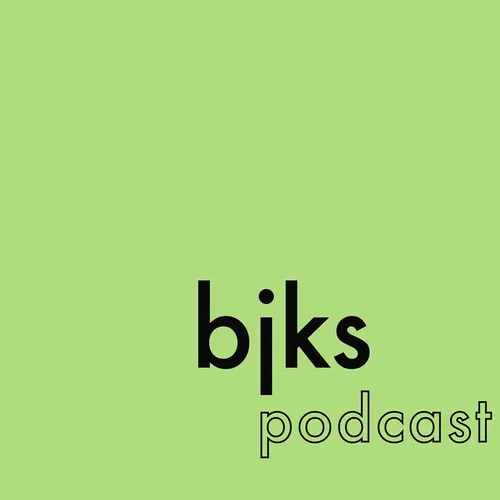
BJKS Podcast
A podcast about neuroscience, psychology, and anything vaguely related. Long-form interviews with people whose work I find interesting.
- Update frequency
- every 9 days
- Average duration
- 82 minutes
- Episodes
- 117
- Years Active
- 2020 - 2025

57. Peter Vuust: music in the brain, predictive coding, and jazz
Peter Vuust is a Professor at the Center for Music in the Brain in Aarhus, a jazz musician, and composer. In this conversation , we talk about his recent review in Nature Reviews Neuroscience, how he…

56. Mary Elizabeth Sutherland: scientific editing, behavioural sciences at Nature, and how to improve submissions
Mary Elizabeth Sutherland is senior editor at Nature, where she edits submissions in the behavioural sciences and cognitive neuroscience. In this conversation, we talk about how she became an editor,…

55. Angelika Stefan: p-hacking, simulations, and Shiny Apps
Angelika Stefan is a PhD student at the University of Amsterdam in the Psychological Methods group (lead by Eric-Jan Wagenmakers). In this conversation, we talk about her preprint 'Big little lies: A…

54. Jessica Kay Flake: Schmeasurement, making stats engaging, and the Psychological Science Accelerator
Jessica Flake is Assistant Professor for quantitative psychology and modeling at McGill University, where she studies measurement. In this conversation, we talk about her recent paper 'Measurement Sc…

53. Chris Chambers: Registered Reports, scheduled peer-review, and science without journals
Chris Chambers is professor at Cardiff University where he is Head of Brain Stimulation. He is also one of the pioneers behind Registered Reports, a type of article where researchers receive peer rev…

52. Postdoc fellowship applications (with Toby Wise)
In this conversation, I talk with Toby Wise about applying for postdoc fellowships. Toby has received and completed the Sir Henry Wellcome Postdoctoral Fellowship, where he worked with Ray Dolan and …

51. Hugo Spiers: Taxi Brains, cognitive maps in humans, and working with humans and non-human animals
Hugo Spiers is professor of cognitive neuroscience at University College London. His research explores how our brain constructs representations of the world and uses them to recall the past, navigat…

50th episode special: reviewing one year of the podcast, lessons learnt, and plans for the future
This is the 50th episode of this podcast and we're doing something a little different: Cody Kommers, PhD student, fellow podcaster, and one of the first guests of my podcast, interviewed me about the…

49. Book club: Conceptual Spaces by Peter Gärdenfors, chapters 7 & 8, & general discussion
This is the fourth and final episode of a book club series on Peter Gärdenfors's book Conceptual Spaces. In this episode, we will discuss chapters 7 and 8, in which Gärdenfors discusses computational…

48. Book club: Conceptual Spaces by Peter Gärdenfors, chapters 5 & 6
This is the third episode of a book club series on Peter Gärdenfors's book Conceptual Spaces. In this episode, we will discuss chapters 5 and 6, in which Gärdenfors explains how semantics and inducti…

47. Book club: Conceptual Spaces by Peter Gärdenfors, chapters 3 & 4
This is the second episode of a book club series on Peter Gärdenfors's book Conceptual Spaces. In this episode, we will discuss chapters 3 and 4, in which Gärdenfors explains how properties and conce…

46. Book club: Conceptual Spaces by Peter Gärdenfors, chapters 1 & 2
This is the first episode of a book club series on Peter Gärdenfors's book Conceptual Spaces. In this episode, we will discuss chapters 1 and 2, which provide an overview over the book, and a discuss…

45. Michael Hornberger: Sea Hero Quest, developing games for science, and Alzheimer's disease
Michael Hornberger is a professor of applied dementia research at the University of East Anglia who developed Sea Hero Quest, a mobile game for studying spatial navigation that was downloaded more th…

44. Dan Quintana: Synthetic datasets, science communication, and podcasting
Dan Quintana is a senior researcher at the University of Olso, where his research focuses on oxytocin, autism, and meta-analyses. In this conversation, we talk about Dan's primer on synthetic datase…

43. Postdoc applications (with Matthias Stangl)
In episode 42 I interviewed Matthias Stangl about his work on spatial navigation. I wanted to ask him a few questions about postdoc applications, but we ran out of time. Matthias kindly agreed to mee…

42. Matthias Stangl: grid cells in aging, path integration, and neural representations of actual physical movement in humans
Matthias Stangl is a postdoc at UCLA, where he studies the neural representations of spatial navigation in social situations. In this conversation, we talk about his PhD work about aging, grid cells,…

41. Reviewing all books called "Prisoner's Dilemma" Part 2: The Mysterious Benedict Society and the Prisoner's Dilemma (Stewart), and Prisoner's Dilemma (Yardley)
This is the second episode of an experiment: I'll be reviewing all books called "Prisoner's Dilemma". Today I'm reviewing The Mysterious Benedict Society and the Prisoner's Dilemma by Trenton Lee Ste…

40. Reviewing all books called "Prisoner's Dilemma" Part 1: A Prisoner's Dilemma (Karabache) and Prisoner's Dilemma (Feiklowicz)
This episode is the start of an experiment: I'll be reviewing all books called "Prisoner's Dilemma", and today I'm starting with the first two books. Basically, I use the Prisoner's Dilemma in my own…

39. Nikolai Axmacher: Reduced grid cells in Alzheimer's risk carriers, landmarks in abstract cognitive space, and clinical translation
Nikolai Axmacher is professor at the Institue for Cognitive Neuroscience at the Ruhr University Bochum where his research focuses on memory, spatial navigation, and neurodegenerative diseases. In thi…

38. Keno Juechems: Where does value (in RL) come from, optimality with finite computational resources, and learning as a PhD student
Keno Juechems is a Junior Research Fellow at St John's College in Oxford. He studies how humans make decisions, using computational modelling, behavioural tasks, and fMRI. In this conversation, we ta…